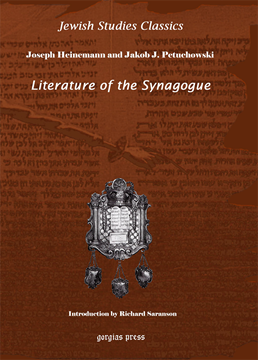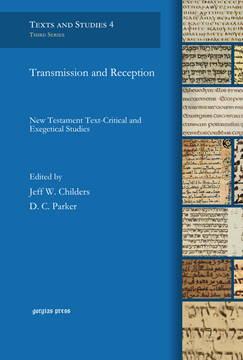Literature of the Synagogue
Edited with introduction and notes by Joseph Heinemann, with Jakob J. Petuchowski. New Introduction by Richard S. Sarason
Series: Kiraz Jewish Studies Archive 4
ISBN: 1-59333-364-1
Literature of the Synagogue is a three-part introduction to the textual heritage of Jewish devotion in the formative stages of its development. Part One presents a varied selection of prayers and liturgies expressive of rabbinic theology and religious feeling. Part Two is devoted to sermons from the classical rabbinic period. Part Three is an anthology of sacred poems and devotional hymns by the great literary masters of the Hebrew Middle Ages.
$165.00 (USD) $99.00 (USD)
Jewish Wisdom
A dictionary of some 4,000 proverbs
By De Ley Gerd & David Potter
ISBN: 1-59333-323-4
The Dictionary of Jewish Proverbs offers the reader a comprehensive insight into the world of Jewish wisdom. It comes in the form of an A-Z Dictionary and represents probably the biggest single collection ever published, with a total of over 4,000 proverbs coming from sources from every corner of the globe. A truly absorbing read, Jewish Wisdom will be an indispensable manual for all lovers of wisdom from whatever religious persuasion and an absolute goldmine of witty and wise things to say when the time is right.
$87.00 (USD) $52.20 (USD)
A Biblical Perspective
Series: Gorgias Eastern Christian Studies 2
ISBN: 978-1-59333-324-9
A popularly-written study of the biblical roots of the Eastern Orthodox Church’s mystical understanding of the knowledge of God. This unique study brings together the best of contemporary exegesis with the tradition of Eastern Christianity and illustrates the biblical roots of the Eastern Church's understanding of grace as the energy of God. The book presents, in lay terms, the shape for an Orthodox biblical theology for the 21st century and will be of interest to all Christians for whom the Bible is divine revelation and for whom tradition continues to be creative.
$173.00 (USD) $103.80 (USD)
Conflict Between Christendom and Islam
By Matti Moosa
ISBN: 978-1-59333-366-9
This book sheds light on the first three Crusades (1097-1191) by introducing material from several medieval Syriac and Arabic sources and reconciling their accounts with those provided by Western sources. It presents the Crusades as an extension of the conflict between Christianity and Islam, which began with the Arabs’ first incursions into Christian territory in the seventh century and continued with their conquest of the Iberian peninsula.
$367.00 (USD) $220.20 (USD)
Transmission and Reception
New Testament Text-Critical and Exegetical Studies
Edited by Jeff W. Childers & David C. Parker
Series: Texts and Studies (Third Series) 4
ISBN: 978-1-59333-367-6
The sixteen studies in this volume explore a variety of topics pertaining to the transmission and reception of the New Testament text. Including articles by Barbara Aland, D. C. Parker, Eldon Epp, Gordon Fee, Everett Ferguson, and others, the results of these studies have important implications for the interpretation of the New Testament and for understanding the formative impact of the text on Early Christianity. Indispensable for those interested in textual criticism, this compilation will be a welcome resource for New Testament scholars, and those interested in Early Christianity.
$170.00 (USD) $102.00 (USD)
The Unveiled Ladies of Istanbul (Stamboul) (Paperback)
Series: Cultures in Dialogue: First Series 13
ISBN: 978-1-59333-217-4
The Unveiled Ladies of Istanbul (Stamboul) is a picturesque description of women's life in post-World War I Turkey during a period of social and political turmoil. Here Demetra Vaka (1877-1946), an expatriate of Ottoman Turkey, established American journalist and acquaintance of Prince Sabaheddin, returns to her native Istanbul after a 20-year absence. Describing women's lives in post-World War I Turkey, she reports on the successful project of female emancipation pursued by Mustafa Kemal as part of the nationalist agenda. Noting how much this project had benefited upper- and middle-class Turkish women, Vaka nonetheless regrets that the gradual emergence of the monocultural, modern Republic was bringing an end to the multiethnic character of the Ottoman State.
$116.00 (USD) $69.60 (USD)





